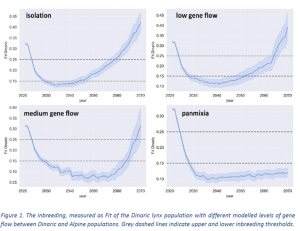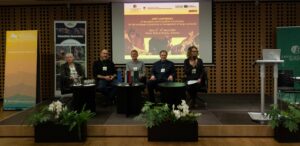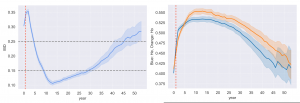Monitoring of the Project Impact on Viability of Lynx in the Dinaric Mountains and South Eastern Alps, and Establishing Guidelines for Ensuring Long Term Viability
The goal of this action is to track the project’s impact on the long-term viability of the Dinaric – SE Alpine lynx population and determine how the population should be managed in the long run. We will use stochastic demographic/genetic computer models in a population viability analysis (PVA) to model future development of the lynx population in Dinaric Mountains and SE Alps and to estimate extinction risks of the lynx population through time. We will use the experience and biological data accumulated in the project to parametrize the models and make them as close to reality as possible. We will model different management scenarios to see how to alleviate risks with effective management. We will use the results to produce science-based guidelines that will help ensure the genetically and demographically robust lynx population established through this project is maintained well into the future. We will organize and summarize the results in the document “Guidelines for Ensuring the Long-term Viability of Lynx in the Dinaric Mountains and South Eastern Alps.”
All reintroductions and reinforcements should have a long-term strategy for success, as recommended by the IUCN Guidelines for Reintroductions and Other Conservation Translocations. To do this, we need to understand how lynx demography and genetics will change in the future. These parameters are difficult to predict in small populations since stochasticity is the major force causing change. However, by using stochastic modelling we can predict a range of possible future scenarios for understanding how the population will respond to different management regimes and specific management actions including changes in lynx mortality, the introduction of new animals, or improvement of fitness caused by a decrease in inbreeding. Estimating how these critical parameters will change over time, and how we can influence them, will help us provide a foundation for effective, long-term management.
Project outputs
- Guidelines for ensuring the long-term viability of lynx in the Dinaric Mountains and SE Alps (EN, pdf)
- Optimal management scenarios for ensuring viability of lynx in the Dinaric mountains and South eastern Alps (EN, pdf)



